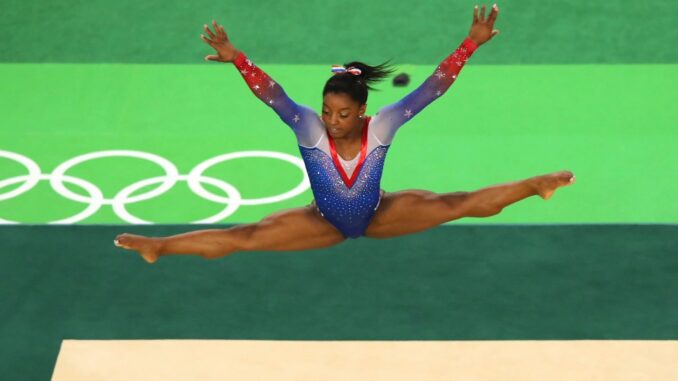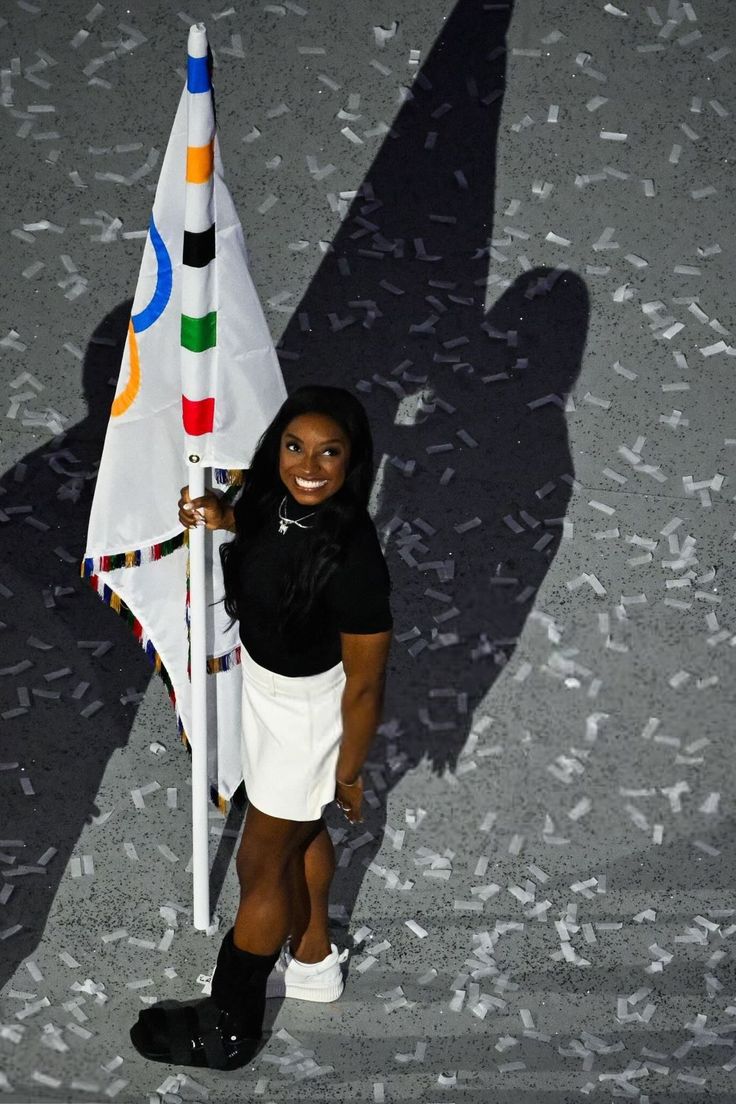
A group of teen girls are suing the state of Oregon over its laws that allow trans athletes to compete in girls’ sports. Two of the girls said they made the decision to file the lawsuit after witnessing the viral feud between Riley Gaines and Simone Biles in June. Maddie Eischen and Sophia Carpenter first entered the national battle when they refused to compete against a trans athlete at the Chehalem Classic back on April 18. They told Fox News Digital that Gaines reached out to them shortly after their forfeit and encouraged them to consider filing a lawsuit against the state. Then, after seeing the fallout of Gaines’ online clash with Biles, Eischen and Carpenter were convinced to file suit.
“I think especially when Riley Gaines and Simone Biles, and that whole thing happened and kind of seeing how that played out and how the public responded, I think that was encouraging to see how many people are on the side of protecting women’s sports,” Carpenter said. Eischen recalls the public reaction she saw to both Biles and Gaines when the war of words started between the two women. Eischen especially recalls seeing the comments on Biles’ recent Instagram posts that night. “All of the comments on Simone’s post were very negative to her, I saw people that commented on it, and I liked it. But there was a lot of shock that she had even said that, and disappointment,” Eischen said.
The feud started when Biles took issue with Gaines, calling out a Minnesota high school whose softball team won a state championship Friday with a transgender pitcher. Gaines noted that comments on X were turned off on the Minnesota State High School League’s post with a photo of the team on social media. Biles responded, calling Gaines “truly sick,” then later sent a second post on X telling Gaines to “bully someone your own size, which would ironically be a male.” Soon after, millions of social media users across the world were chiming in.
Carpenter agreed she saw people in her social circles, who didn’t often discuss the topic of trans athletes in women’s and girls’ sports, suddenly getting in on the conversation. “Your average American … I think a lot of people don’t pay as much attention to this issue, and I think that with that with the whole Simone Biles and Riley Gaines, with all that fallout, that definitely brought some more attention,” Carpenter said. “It kept it in the news cycle, it kept people looking and saying ‘hey, there’s this issue in girls’ sports that’s happening a lot more than people think it is.'”
The Clash That Sparked a Movement
It started as just another online debate. But when Riley Gaines, a vocal advocate for women’s sports, and Simone Biles, America’s most decorated gymnast, clashed over transgender inclusion in athletics, the ripples reached far beyond Twitter threads. Now, a group of Oregon high school girls are taking that debate into the courtroom, suing their state over its trans athlete policies.
What seemed like celebrity noise quickly became a symbol of something bigger—a culture war moment with real-life consequences. Let’s unpack how this happened.
Riley Gaines: The Voice of Fairness in Female Sports
Who Is Riley Gaines?
Riley Gaines is a former collegiate swimmer who competed against transgender athlete Lia Thomas. After that, she became a leading figure advocating for “fairness” in women’s sports, arguing that trans women hold unfair biological advantages.
Why She’s Speaking Out
She believes that inclusion is important, but not at the expense of competitive equity. Her stance gained traction as she began appearing on major media outlets and speaking at colleges nationwide.
Simone Biles Enters the Chat
Why Simone Biles Got Involved
Simone Biles is not just a gymnastics icon—she’s a voice for mental health, inclusivity, and women’s empowerment. When Gaines made a public statement against trans inclusion, Biles responded on social media, calling for empathy and inclusion.
The Feud Goes Public
Things got intense. Gaines accused Biles of turning her back on female athletes. Biles fired back, implying Gaines was fearmongering. What started as a difference in opinion exploded into a full-on social media feud.
The Internet Took Sides—And So Did the Country
Divided Reactions
Twitter, Instagram, and TikTok lit up. Hashtags like #ProtectWomensSports and #TransRightsAreHumanRights trended simultaneously. Both sides accused the other of extremism.
Mainstream Media Coverage
From Fox News to CNN, everyone jumped on the story. News segments, op-eds, and podcasts debated the same question: Can fairness and inclusion coexist in youth sports?
Oregon Girls Take Legal Action
Who Are the Plaintiffs?
A group of Oregon high school girls, all athletes, filed a lawsuit against the state, citing unfair competition due to transgender athletes participating in girls’ sports.
Why They’re Suing
They argue that state policies violate Title IX, the federal law meant to protect equal opportunities for women in education and sports. They say their chances at scholarships, wins, and fair play are being compromised.
Inside the Lawsuit
Legal Grounds
Their lawyers are leaning on Title IX and equal protection clauses. They’re also using biological science as part of their argument, claiming that sex-based differences can’t be ignored in competitive settings.
What They Want
They’re not asking to ban anyone. What they want is separate divisions or modified rules to ensure fairness without discrimination.
The Science Behind the Debate
Is There a Biological Advantage?
Studies show that after puberty, biological males typically develop more muscle mass and bone density. While hormone therapy reduces some of that advantage, it doesn’t erase it entirely—especially in speed, power, and endurance sports.
Counterpoint: Inclusion Matters
Trans advocates argue that sports should be about access and participation, especially at the youth level, and that strict rules can increase bullying and mental health issues among trans teens.
The Simone Biles Effect
Why Her Voice Matters
Biles’ platform is massive. With millions of followers and international respect, her stance sent a strong message: Inclusion is not up for debate in her eyes.
Did She Underestimate the Pushback?
Possibly. While many praised her compassion, others felt betrayed by someone they saw as a champion of women’s excellence. The backlash fueled Gaines’ movement even more.
Gaines Rallies the Base
Going Beyond Social Media
Gaines organized rallies and partnered with advocacy groups. One rally in Oregon featured some of the same high school girls who would later become plaintiffs.
Grassroots Turns to Legal Force
That rally wasn’t just symbolic—it planted seeds. Attorneys met the girls there. What started as a protest turned into a legal strategy.
The Political Backdrop
Oregon’s Stance on Trans Athletes
Oregon supports inclusive policies. Trans girls are allowed to compete based on their gender identity without undergoing medical transition.
Federal vs. State Rights
The lawsuit could create a legal domino effect. If successful, it may challenge how states align with federal guidance under the Biden administration, which supports trans inclusion.
What’s at Stake
For the Girls Suing
They face potential public backlash, but they’re also getting national support from conservative organizations and women’s rights groups.
For Trans Athletes
The case could set limits on their participation, potentially leading to national restrictions based on biological sex rather than gender identity.
For Schools and Coaches
This lawsuit may force schools to redefine eligibility, change recruiting practices, and possibly split divisions in sports.

Public Opinion Is Split—And Growing More Divisive
Polls show a nation divided:
-
Around 60% support trans athletes’ participation in some form.
-
About 40% believe only biological females should compete in girls’ divisions.
Clearly, there’s no consensus—and the Oregon case may tip the scales one way or the other.
Media Framing Matters
Right-leaning outlets paint the girls as brave and bold.
Left-leaning sources see them as misled or manipulated.
In reality, they’re teenage athletes making a bold legal move in a deeply polarized moment.
International Attention
Even global media picked up the story. The U.K., Canada, and Australia are facing similar debates. Oregon might just become ground zero for a worldwide shift in how youth sports are governed.
What Happens Next?
The case is still in early stages. If it proceeds, it could make its way to federal courts—and potentially the Supreme Court.
This isn’t just about Oregon. It’s about what fairness means in the future of sports across America.
Final Thoughts: This Feud Was More Than a Fight
What started as a heated exchange between two elite athletes has now triggered legal action that could change the rules of the game—literally.
Whether you side with Riley Gaines or Simone Biles, one thing is clear: this conversation isn’t going away. And the Oregon lawsuit? It’s just the beginning.